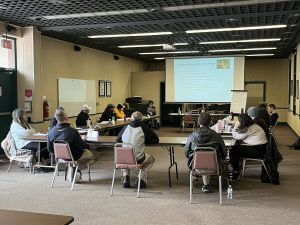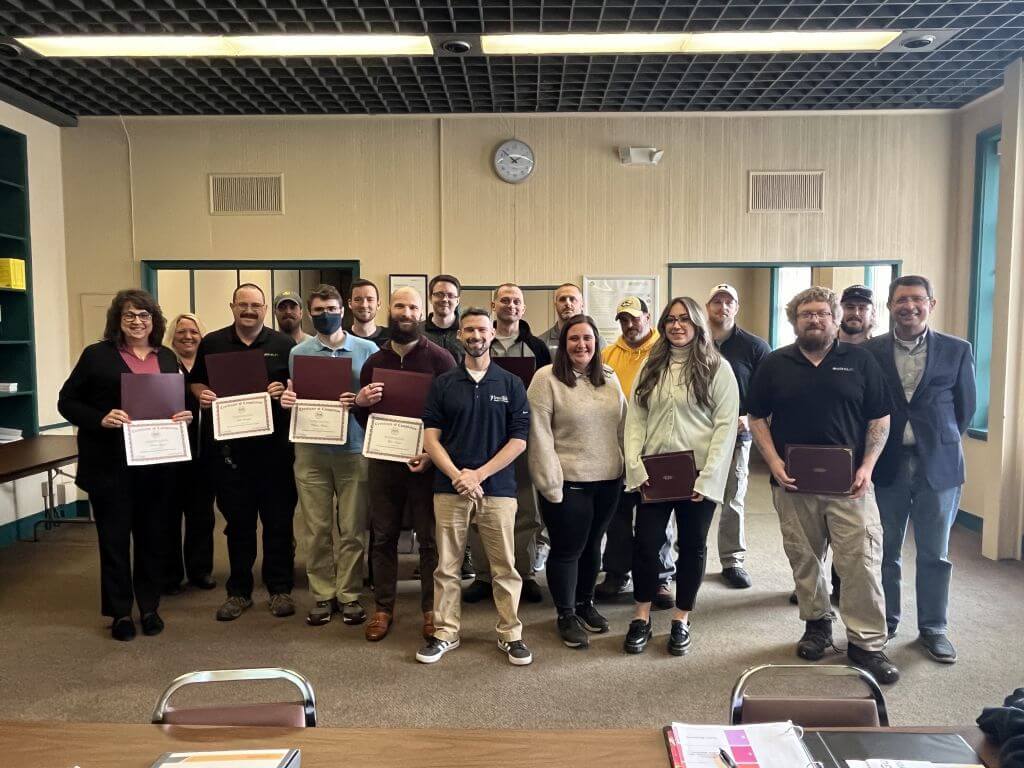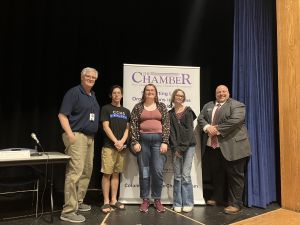Member Highlight -Marker Development Group
 We are pleased to showcase Marker Development Group who joined the Chamber in March of 2023.
We are pleased to showcase Marker Development Group who joined the Chamber in March of 2023.
Take your business to the next level and grow your C-Suite Level Contacts.
Whether your needs are hosted VOIP migration, security, asset tracking, safety surrounding your business or the latest technology in Body Worn Cameras - Marker Development Group can help you develop, define and close business relationships through consultative selling strategies.
Member News – May 17, 2023
Press Enterprise to hold "Best of the Best" Contest
2023 Covered Bridge Photo Contest Returns! - Experience Columbia -Montour Counties
Each year, the Visitors Bureau holds a photo contest to produce a 550-piece puzzle featuring one of the area-covered bridges. The 2023 Covered Bridge Photo Contest runs from Saturday, April 1st through Wednesday, May 31st at midnight EST. We’re excited to see another fantastic set of entries from everyone! Click HERE to learn how to enter!
PATHS Training May Webinars
The Bureau of Workers' Compensation, Health & Safety, will be offering numerous FREE safety webinars in May 2023. To access the PATHS Training Calendar visit www.dli.pa.gov/paths
First Commonwealth Bank Offering Virtual Seminar
Do you have customers that have questions about Buying a New Home? First Commonwealth Bank is offering a virtual seminar Thursday, May 18, 2023, 7:00 p.m. - 8:00 p.m. Hosted by Jeff Woodward, FCB Senior Mortgage Loan Originator Feel free to join or alert your clients. To RSVP, please visit here: Home Buyer Seminars | First Commonwealth Bank (fcbanking.com)
Armed Forces Day at Knoebels
As a way of saying thank-you for serving our country, Knoebels Amusement Resort invites members of the US Armed Forces to enjoy a free ride pass on May 20.
Service 1st Retirement & Investment Center Welcomes Culver and Announces DeFalco as Financial Advisor
Two familiar faces at Service 1st Federal Credit Union are now assisting members in their new roles with the Service 1st Retirement & Investment Center. Read the full story.
First Keystone Corporation Holds Annual Meeting, Announces Re-Elections and Promotions
Congratulations to the following individuals, whose promotions were announced at the recent annual shareholder meeting of First Keystone Corporation, the parent company of First Keystone Community Bank: evin Krieger, Compliance Officer, and Rebecca Hooper, Senior Trust Officer, were promoted to Senior Vice President. Lauren Duane, Business Services Manager; Kathy Jarski, Regional Branch Administrator; Sandy Cole, Community Office Manager II; John Dougherty, Community Office Manager II; and Kim Shiner, Community Officer Manager II, were promoted to Vice President. Stacy Gordner, Accounting Manager; Yolanda Francis, Regional Branch Administrator/Training Specialist; Levi Diltz, Compliance Administrator; and Melanie Fisher, Credit Analyst II, were promoted to Assistant Vice President. Joan Henry, Loan Operations Supervisor; Geovany Elias, Commercial Services Officer I; Jennifer Groblewski, Community Office Manager I; Dylan Woodard, Systems Engineer/Assistant IT Manager; Alex Klinger, Accountant I/Loan Data Specialist; Dawn Bettinger, Commercial Loan Documentation Specialist I; and Jordan Beach, Collector/Loan Servicer, were promoted to Officer. For the full story, click here.
Governor's Safety Award Nominations Open
Proud of your safety and prevention program? Consider applying for the Governor's Award for Safety Excellence. Nominations are due June 1.
2nd Annual Recovery Picnic to be Held in June
Susquehanna United Way's United in Recovery program will be hosting its 2nd Annual Recovery Picnic on June 15, 11:00 am - 1:30 PM at 163 Briar Creek Lake Park Road, Berwick, PA, 18603. RSVP to the event here.
IMC to host Webinar Series
The Innovative Manufacturers' Center will be hosting a free four-part webinar series about attracting and retaining employees. The series starts July 25th. See full details.
Future Leaders in STEM Event Postponed to Fall 2023
The Bloomsburg Children's Museum, The Foundation of The Columbia Montour Chamber of Commerce, The Bloomsburg YMCA, and the Teen Center are working together to bring TEDx-style talks, vendors, activities, and workshops. The event is free but registration is required. Stay tuned for more information!
Access Local Election Results
 Last week, the Columbia Montour Chamber of Commerce had the privilege to offer the community a glimpse into the candidates vying to serve as County Commissioners in Columbia County through our candidate forum. With the primary election concluded, we look forward to the general election, where we hope to play a continued role in learning more about those interested in serving in leadership positions and holding public office. Most of all, the Chamber is committed to elevating the level of professionalism, decorum, civility, and transparency across our footprint, setting aside the vitriol of the national political atmosphere.
Last week, the Columbia Montour Chamber of Commerce had the privilege to offer the community a glimpse into the candidates vying to serve as County Commissioners in Columbia County through our candidate forum. With the primary election concluded, we look forward to the general election, where we hope to play a continued role in learning more about those interested in serving in leadership positions and holding public office. Most of all, the Chamber is committed to elevating the level of professionalism, decorum, civility, and transparency across our footprint, setting aside the vitriol of the national political atmosphere.
Candidates and local organizations interested in joining the Chamber's vision for public service are invited to sign and return the Chamber's Code of Conduct.
Congratulations to the candidates who participated in the most recent election - a primary election in Columbia County, and a primary and special election in Montour County. For up-to-date election results, please visit your county's election websites, listed below:
Columbia County Election Results
Montour County Election Results
For local coverage or interpretation of these results, please reach out to local media.
Leverage Small Business Resources Year-Round
Sources: US Chamber of Commerce, Columbia Montour Chamber of Commerce
 Many organizations provide support and online tools for small business owners and employees. Take advantage of these free resources during Small Business Month and throughout the year. Trying to keep costs down? There are plenty of free business resources online...and plenty more that are just around the corner.
Many organizations provide support and online tools for small business owners and employees. Take advantage of these free resources during Small Business Month and throughout the year. Trying to keep costs down? There are plenty of free business resources online...and plenty more that are just around the corner.
Successful entrepreneurs never stop learning about their industry, business, and customers. They look for ongoing training opportunities for themselves and their staff. Free resources for small business owners help you break into the global marketplace, assess economic growth, and identify new business opportunities. Celebrate Small Business Month and improve your company year-round using small business resources and online tools to reach your goals. Each of the following organizations and websites provides actionable information requiring just a few clicks.
1. U.S. Small Business Administration (SBA) and Local SBDCs
Learn how to start, grow, or sell your business using the SBA’s free resources. The SBA offers informative content, interactive online tools, and a video library for entrepreneurs. These range from business planning solutions to mentoring services.
You can explore export assistance programs and financial resources. Both help grow businesses and enable entrepreneurs to strengthen their market position. Or learn how to qualify for government contracts, get funding for your company, and explore business certifications.
Check out these SBA tools and content:
- Small Business Development Centers: Attend in-person events and get individualized assistance from small business centers near you. In Montour County, connect with the Bucknell Small Business Development Center. In Columbia County, connect with the Wilkes University Small Business Development Center.
- SBA’s Ascent: Explore Ascent—a free learning platform for women entrepreneurs—by choosing your journey and topics to master. Content options include fireside chats, self-assessments, discussion guides, and exercises.
- Learning center courses: The SBA’s learning center video courses cover starting up to selling your business and everything in between. Most topics have several videos, with many around a minute long.
- Boots to Business: If you’re a transitioning service member (including National Guard and Reserve) or a spouse with access to a military installation, check out the Boots to Business program. Alternatively, Reboot courses are available to veterans, National Guard, Reserve, and military spouses.
- Leadership Programs: If you have at least one employee besides yourself, have been in business for three years, and have annual revenues of at least $250,000, consider the six-month T.H.R.I.V.E. Emerging Leaders Reimagined program. It provides MBA-equivalent knowledge, and you’ll create a three-year strategic business growth action plan. Looking for something more local and community-specific? How about developing your team through the Foundation of the Columbia Montour Chamber's Leadership Central Penn program? Thirty years of alumni speak glowingly of the program.Need more information about importing and exporting? Have you connected with the experts over at SEDA-COG?
2. WedNET
Created by the PA Department of Community & Economic Development and made available through the Workforce and Economic Development Network of Pennsylvania, the WEDnetPA program provides qualified employers training funds for new and existing employees. WEDnetPA is a unique, collaborative partnership of community colleges, state system universities and other educational institutions working together to be responsive to the needs of Pennsylvania’s business community. Better yet? Our local WEDnetPA Partner is none other than Commonwealth University - Bloomsburg Campus, and the program that the Chamber partners with the university to deliver, the Management & Leadership Certificate program, is an approved program! Contact Jennifer Williams for more information on WEDnetPA funding and stay tuned here for more about the next Management & Leadership Cohort (Fall 2023)!
3. HubSpot
HubSpot is a cloud-based customer relationship management (CRM) tool offering free and paid courses. It also provides the HubSpot Academy for ongoing education geared toward your entire team, including leaders, department supervisors, and employees. There are dozens of programs, including free online courses and longer certification sessions, and you can display earned badges on websites and company bios.
Achieve certifications through business courses, such as:
- Digital marketing.
- Inbound sales.
- Growth-driven graphic design.
- Content marketing.
- Digital advertising.
- Sales management.
- Email marketing.
Also, check out HubSpot’s Website Grader. Enter your company’s website and email address and click “get your score.” HubSpot grades your site based on performance, search engine optimization (SEO), mobile, and security. It also provides a list of recommendations for site improvements.
4. Service Corps of Retired Executives (SCORE)
SCORE provides many great resources for small business owners, including webinars, interactive courses, business templates, and local workshops. SCORE partnered with Google and the International Downtown Association (IDA) to develop a free digital readiness series. Each module provides digital tools, webinars, and videos on how to grow your business with Google.
Recently, SCORE added The Startup Roadmap. It’s an excellent guide for individuals wanting to start a company. An entrepreneur can complete the step-by-step tutorial alone or with a mentor. It has 12 modules, which you can complete in any order. Each module offers actionable steps, free resources, and other online tools to complete the steps.
You can find SCORE events and workshops near you by entering your state or zip code and filtering the results according to business stage, topic, and format. SCORE also offers mentorship opportunities to any citizen or permanent resident who owns a business or wants to start one. The interactions happen virtually so that you can communicate with your mentor via email, phone, and video.
5. The Columbia Montour Chamber of Commerce (Your existing member benefits)
You've invested in membership, but are you aware of all of the benefits that go with it? These benefits are constantly improving and changing, and we want to help you make the most of them. Whether that's connecting you with members, community partners, local governments, helping you find answers to questions, or advocating on your behalf, your Chamber exists to represent your business in building vibrant and sustainable communities. You have access to Chamber committees, ribbon cutting and celebration resources, marketing efforts, communications, events, and so much more.
There's barely enough space to write about our partnerships with MyBenefit Advisor (more below), energy consultants at World Kinect Energy, the dividend-paying Chamber program with Penn National Business Insurance,
Through the Chamber, you also get the benefits of our relationships with state and national partners - the PA Chamber of Business & Industry and the U.S. Chamber of Commerce, which host resources like the U.S. Chamber of Commerce Small Business page and its Small Business Weekly Forecast. You can also view videos, forums and interviews with experts, business leaders, and officials on the U.S. Chamber's Chamber OnDemand platform or expand your small business knowledge on CO, which delivers fact-based articles on best practices for how to start, grow, and run your company.
6. LinkedIn
LinkedIn is a professional-focused social media platform used by entrepreneurs globally. You can showcase your company and build relationships with business customers and future employees. It’s also a key spot to highlight your expertise as an entrepreneur in your personal profile. Get started with LinkedIn’s Action Plan for Small Businesses. It’s a five-page guide to completing your page, growing your follower count, and posting the right content.
But don’t stop there! LinkedIn has a small business resource center packed with free content. It offers virtual events, free online courses, and livestreams. The virtual sessions are geared toward entrepreneurs at all levels, including managers and leaders, talent acquisition professionals, remote workers, and sales teams. We recommend Boost Your Business With LinkedIn for existing businesses, as it’s a video guide to using LinkedIn for branding, lead generation, and hiring.
7. Constant Contact
Constant Contact is an online marketing platform tailored to small businesses. It offers various free tools and other resources for small businesses. Topics include email, social media, SMS texting, online stores, and websites. Constant Contact also provides educational webinars, seminars, and local events year-round.
This platform can help your team members level up their skills while improving operations. It includes small business resources for digital marketing tailored to your skill level—just starting out, up and running, or advanced marketer.
8. HR.com and MyBenefit Advisor
Manage human resources effectively with a free membership and resources from HR.com. It has e-learning lessons, webcasts, and virtual events. You can learn about upcoming changes to regulations and help your HR employees achieve Professional in Human Resources (PHR) and Senior Professional in Human Resources (SPHR) certifications.
Free resources for small businesses consist of:
- HR compliance posters.
- Industry trends and research papers.
- HR certification prep courses.
- More than 5,000 educational webcasts.
- Recertification credits.
- HR forms, templates, and tools.
- Publications in more than 13 verticals.
Looking for more HR tools and a live person to talk to? Look no further than the Chamber's MyBenefit Advisor partnership for even more quality resources.
9. Networking Groups
Networking groups for entrepreneurs like BNI Central PA, One Million Cups Susquehanna Valley and industry specific groups like IMC (Innovative Manufacturers Council) can help you make meaningful local connections. Don't forget the Chamber's monthly Business After Hours too...events that are free to attend for members and non-members alike. In case you haven't heard, we've got these special monthly events scheduled 10 months out now!
10. Google
A Google Business Profile, formerly Google My Business, can drive customers to your brick-and-mortar storefront and online platform. It also offers many free tools for entrepreneurs and small teams, including Google Workspace and Google Drive. The Google for Small Business page provides a wealth of information for small business owners, helping you navigate SEO, advertising, and marketing.
Course topics include:
- Getting your business online.
- Standing out on Search and Maps.
- Understanding SEO.
- Gathering insights.
- Starting an online store.
- Using email marketing.
- Advertising online.
The small business lesson collection helps you research your market, develop a business plan, and prepare to request funding. Also, check out the Grow with Google small business showcase on YouTube. It offers more than 250 videos covering topics like project management and data analytics.
LinkedIn has a small business resource center packed with free content. It offers virtual events, free online courses, and livestreams.
11. MIT Open Learning Library
Expand into a new industry and explore diverse courses through the MIT Open Learning Library. These self-paced lessons are free to download. Most courses include interactive content and exercises, which provide immediate feedback. These sessions are a great free resource for businesses wanting to offer professional development options for employees.
The topics include:
- Aeronautics and astronautics.
- Biology.
- Comparative media studies and writing.
- Earth, atmospheric, and planetary sciences.
- Electrical engineering and computer science.
- Global languages.
- Linguistics and philosophy.
- Management.
- Materials science and engineering.
- Mathematics.
- Nuclear sciences and engineering.
- Physics.
- Urban studies and planning.
- Harvard-MIT program in health sciences and technology (HST).
12. FDIC: Money Smart for Small Business
Boost your financial literacy with 13 modules for starting and managing a business. The materials and instructor-led curriculum were developed jointly by the Small Business Administration and Federal Deposit Insurance Corporation (FDIC). You can download financial resources at Money Smart – Teach – For Small Business.
The lessons consist of:
- "Is Owning a Business a Good Fit for You?"
- "Planning for a Healthy Business"
- "Banking Services Available for a Small Business"
13. National Federation of Independent Businesses (NFIB)
NFIB has many free guides and online presentations. It offers additional resources for members. We recommend checking out NFIB’s research, webinars, Small Business Rundown podcast, and legal channels. A recent podcast discusses the health insurance affordability crisis, while webinars cover HR, marketing, tax, legal, and credit and finance.
14. National Retail Federation (NRF)
NRF is a must-visit site if you’re a retail business. It provides tons of research for planning upcoming campaigns and making seasonal financial projections. NRF is the world’s largest retail trade association and completes studies throughout the year, including sections for various holidays where you can compare consumer shopping figures from the past several years.
We suggest using NRF’s research to inform your campaigns and strategies. Two of the latest reports are the NRF 2023 Sales Forecast and the NRF State of Retail & the Consumer.
15. IRS Small Business and Self-Employed Tax Center
Get answers to your small business tax questions at the IRS Small Business and Self-Employed Tax Center. It provides free resources for taxpayers who file Form 1040 or 1040-SR and small companies with assets under $10 million.
Access information for:
- Preparing your taxes.
- Filing and paying taxes.
- Stages of owning a business.
- General topics.
- Online learning.
We're going to keep publishing information like this to keep you informed, because as far as resources go, this quick list is really only scratching the surface. We haven't even started referencing the local university resources, non-profit opportunities, grants, or community partners like DRIVE (economic development) and Advance Central PA and the PA CareerLink. Stay tuned! Still don't have what you need? Call Brenda Flanagan, Administrative Assistant at the Columbia Montour Chamber, and we'll be happy to brainstorm additional ways to get you and your organization the resources you need to be successful. 570-784-2522.
How to Choose the Right Insurer for Your Benefit Plans
Source: MyBenefit Advisor
Author: Renay Gontis
 Offering the right mix of benefits to employees is a daunting task for almost any company. Yet most business owners understand the importance and value a strong employee benefit portfolio has on their company’s growth and overall success. But choosing the best benefits is only part of the story. Choosing the right insurance carriers to provide those benefits is not only the other part of the story, but an often undervalued aspect as well.
Offering the right mix of benefits to employees is a daunting task for almost any company. Yet most business owners understand the importance and value a strong employee benefit portfolio has on their company’s growth and overall success. But choosing the best benefits is only part of the story. Choosing the right insurance carriers to provide those benefits is not only the other part of the story, but an often undervalued aspect as well.
When evaluating different carriers for benefit plans, there are several things employers should consider prior to making a decision. While working with a benefits broker or consultant will greatly simplify this process, it is ultimately up to the business owner to assure the carrier selection is the best fit for their company. Here are a few points to consider:
Carrier Credentials…In addition to checking that carriers are licensed to do business in any state(s) with client locations, decision makers should also seek assurance that the carrier is financially sound and meets all state requirements such as those involving required premium reserve levels.
Diversity of Products and Services…Most companies today, especially those with more than a few employees, tend to offer multiples plan options for their employees to choose from. The right carrier should have a wide portfolio of plans available for any group. Which of those plans should be in the company benefit package? That should be based on the specific demographics of each business, the health care needs of that population and the company budget.
Provider Networks…Prior to including a plan in the company’s benefit portfolio, the decision maker should be assured that employees and their families will be comfortable choosing from the physicians and hospitals within the provider’s network.
Cost Competitiveness…This is obvious, but with all other factors being equal, the plan premiums for both the company and it’s employees are a major factor in any decision to choose or bypass a carrier.
Level of Technology…Online access to health information, digital tools and monitoring and other technology can assist in the management of health issues, taking stress away from employees seeking enhanced well-being and providing employers utilization based savings in the process.
Customer Service Experience…Research the level of personalized customer service that the provider offers members. Especially in smaller businesses, where there are fewer if any human resource personnel for employees to turn to for help with claim issues, a friendly, responsive and effective call center can make or break the employee experience.
The Columbia-Montour Chamber of Commerce offers its members access to My Benefit Advisor as a solution for employee benefits, including voluntary offerings. For more information about My Benefit Advisor, visit our website at cmcc.mybenefitadvisor.com or contact Stephen Lylo at (800) 377-3539.
Spring Management & Leadership Cohort Graduates
Employers in Columbia and Montour Counties who are seeking professional development opportunities for their employees are often pleasantly surprised to learn about the plethora of training opportunities available in our region. Whether it's small business owners looking for guidance from the Small Business Development Centers, or c-suite professionals looking to engage middle-managers or newcomers through Leadership Central Penn, webinars through McKonly & Asbury, MyBenefit Advisor, IMC, NEPIRC, SHRMA, or many more of our Chamber and regional partners, there's something for every audience. However, we're thrilled to remind employers that a key component of the Chamber's employee development programs is a collaboration between the Chamber and Commonwealth University: Bloomsburg Campus, that takes the form of a certificate program called "Leadership & Management".

Four aspects of this program make it incredibly worthwhile. First, it can be done on-site at your business for just your employees (class size depending), or your employees can join a seasonal cohort. Second, it includes incredibly relevant training and course materials, including the role of the supervisor and effective communication/listening, change management and understanding what motivates employees, coaching, feedback and performance management, navigating a multigenerational and diverse workforce and resolving conflict & reaching agreement. Third, participants who graduate leave the program with professional development goals in place. Finally and perhaps best of all, it's eligible for WEDnetPA funding.
If you're unfamiliar with WedNet, it's a program built into the Pennsylvania budget through the Department of Community and Economic Development, designed to give Pennsylvania a competitive edge. The program provides qualified employers training for new or existing employees, allowing them to stay competitive while keeping skills current and relevant. When employers enroll their employees in WEDnetPA-approved programs, their eligible costs for that training are reimbursable.
Low on professional development dollars in your budget, but need that competitive edge? Jennifer Williams, of Commonwealth University, our program partner in Bloomsburg, can help facilitate that funding for our approved program. Below, you'll see photos from our recent graduates, who participated in one of our Spring cohorts (the one below was hosted by Autoneum).
Congratulations to our Spring graduates! Interested in WEDnetPA funding or sending your employees to our Fall cohort? Contact Jennifer Williams at (570) 389-4004.

Recap: Chamber Hosts Candidate Forum
The Columbia Montour Chamber of Commerce is pleased to announce the release of the full recording of the May 9, 2023 Candidate Forum, featuring eight of the nine Republican candidates seeking the office of Columbia County Commissioner. The election will take place on May 16. Originally livestreamed via the Chamber’s YouTube channel, some technical complications at the start of the evening prevented the opening 10 minutes from being seen by our original, livestream audience. Now, thanks to the tireless work (and great thinking) of the faculty and students of Central Columbia High School’s Communications and Technology program, the full program, including the opening introduction and the first few candidates remarks which were previously cut off, are now available in full. Please note that in viewing the new video, the opening card remains on the screen for the first seven minutes, but the audio exists in its entirety.

Thank you to the students who recorded and livestreamed our event!
As to the event itself, decorum, professionalism, rules of order and collaboration – the bulwark of the Chamber’s recently adopted Code of Conduct – were on full display during the forum, and we’re delighted to offer this video to all residents of Columbia County ahead of the primary election. We were also thrilled that the in-house audience provided excellent questions to supplement our own. Thank you for your engagement!
Special thanks to the following individuals and organizations who made this program possible:
Superintendent Jeff Groshek, Principal Adam Comstock, the Communications and Technology program, the students and faculty who turned over the facility from the musical (a huge feat), Mark Gardner of M&T Bank, who served as timekeeper for the forum, and the Visionary and Advocate members of the Chamber, whose investment in Chamber membership make possible the strategic initiatives of our five focus areas: advocacy, benefits program, employee development, and strengthening our communities.
Tune in to the program below, or visit our YouTube page, here.
Member News – May 10, 2023

PPL Donation Supports Hands-on Technology Education
PPL Electric Utilities is donating $8,000 to assist area high school students taking college-credit courses at Pennsylvania College of Technology.
Through the Educational Improvement Tax Credit Program, PPL Electric is boosting Penn College Dual Enrollment, which enables academically qualified high school and career and technology education center students to take courses tuition-free during their regular school day. See Full Press Release.
Future Leaders in STEM Event - May 20
The Bloomsburg Children's Museum, The Foundation of The Columbia Montour Chamber of Commerce, The Bloomsburg YMCA, and the Teen Center are working together to bring TEDx-style talks, vendors, activities, and workshops. The event is free but registration is required. Register here.
Glen Brook Rehab to Host Open House
Tomorrow, May 11th from 3:00 - 6:00 pm, Glen Brook Rehab is celebrating its newly renovated sub-acute rooms. See their Open House Flyer 5.11
DBA Continues Downtown Fun
If you missed the 37th Annual Spring Fling in Danville on May 6th, you can catch up on the fun at the Danville Business Alliance's Third Thursdays this summer. May 18th kicks off this series of events with Bason's Coffee, Troop 47 Trading Co, and many other businesses open late. Check out all event details here.
Press Enterprise to hold "Best of the Best" Contest
First Keystone Community Bank Vice-President Wins National Banking Scholarship
Natalie Stackhouse, MBA Controller/Vice President at First Keystone Community Bank was one of 2 scholarship winners of the Owen Scholarship for Emerging Community Bank Leaders. See more details about the scholarship here.
2023 Covered Bridge Photo Contest Returns! - Experience Columbia -Montour Counties
Each year, the Visitors Bureau holds a photo contest to produce a 550-piece puzzle featuring one of the area-covered bridges. The 2023 Covered Bridge Photo Contest runs from Saturday, April 1st through Wednesday, May 31st at midnight EST. We’re excited to see another fantastic set of entries from everyone! Click HERE to learn how to enter!
PATHS Training May Webinars
The Bureau of Workers' Compensation, Health & Safety, will be offering numerous FREE safety webinars in May 2023. To access the PATHS Training Calendar visit www.dli.pa.gov/paths
First Commonwealth Bank Offering Virtual Seminar
Do you have customers that have questions about Buying a New Home? First Commonwealth Bank is offering a virtual seminar Thursday, May 18, 2023, 7:00 p.m. - 8:00 p.m. Hosted by Jeff Woodward, FCB Senior Mortgage Loan Originator Feel free to join or alert your clients. To RSVP, please visit here: Home Buyer Seminars | First Commonwealth Bank (fcbanking.com)
OSHA - National Beat the Heat Contest
OSHA is sponsoring a “Beat the Heat Contest” to raise awareness about the hazards of heat exposure in indoor and outdoor workplaces and identify how businesses across the nation control these hazards. Participants are asked to submit an awareness tool (e.g., infographic, poster, training curriculum, webpage, logo, etc.,) to increase heat hazard recognition among employers and workers.
To enter the contest and get more details go here. The contest is open now through June 9, 2023.
2nd Annual Recovery Picnic to be Held in June
Susquehanna United Way's United in Recovery program will be hosting its 2nd Annual Recovery Picnic on June 15, 11:00 am - 1:30 PM at 163 Briar Creek Lake Park Road, Berwick, PA, 18603. RSVP to the event here.
IMC to host Webinar Series
The Innovative Manufacturers' Center will be hosting a free four-part webinar series about attracting and retaining employees. The series starts July 25th. See full details.
Reset and Refresh: Spring Cleaning to Enhance Productivity at Work
Source: Mckonly & Asbury
Why Do We Talk About Spring Cleaning?
Spring cleaning isn’t some modern marketing campaign. Its roots trace back 3000 years to the Iranian practice of “shaking the house” before the Persian New Year each spring. Cleaning is also found in Chinese New Year’s traditions. Even Judaism encourages cleaning during Passover in spring. Symbolically, many cleaning rituals represent a clearing out of bad energies to make room for good things in the coming year.
 In a practical sense, we clean our homes in spring because we used to use kerosene and coal in the 1800s. During winter, with windows closed, the soot from burning coal and kerosene would coat the house. You had to wait until warmer weather in spring to open the windows and start cleaning the grime. Winter and fewer daylight hours can also make us lethargic and unhappy (also called Seasonal Affective Disorder). When we finally start gaining energy in the spring is when we realize we need to catch up on tasks like cleaning.
In a practical sense, we clean our homes in spring because we used to use kerosene and coal in the 1800s. During winter, with windows closed, the soot from burning coal and kerosene would coat the house. You had to wait until warmer weather in spring to open the windows and start cleaning the grime. Winter and fewer daylight hours can also make us lethargic and unhappy (also called Seasonal Affective Disorder). When we finally start gaining energy in the spring is when we realize we need to catch up on tasks like cleaning.
Benefits of a Clean Workspace
But spring cleaning goes well beyond reorganizing our sock drawers. We must translate these principles into the workplace. From psychological to physical, the benefits of spring cleaning in the workplace are many.
Many people feel overwhelmed in their work with how much they must do. Often, this translates into piles of papers, projects, and even sticky note reminders plastered everywhere across the office. Introducing this chaos to your workspace can add unneeded psychological stress.
A Princeton study found that when we focus, our brains hone in on a singular purpose. But add visual clutter to that, and these competing objects pull our attention away. “The more objects in the visual field, the harder the brain has to work to filter them out, causing it to tire over time and reducing its ability to function.” This causes us to lose focus, lowering our productivity.
But messiness at work or at home (where many of us work now) affects our physical and mental health too. In one study, women who described their surroundings as cluttered or stressful showed “flatter diurnal slopes of cortisol, a profile associated with adverse health outcomes.” Women whose homes were deemed restorative spaces were less likely to experience depressed feelings daily.
How to Make Your Office More Productive with Spring Cleaning
Albert Einstein once joked: “If a cluttered desk is a sign of a cluttered mind, of what, then, is an empty desk?” A chaotic workspace might have worked for Einstein, but we’re not him. Therefore, it’s best that we stick to our spring-cleaning rituals.
If you want a more productive office, you need to clean. Here are three ways to maximize efficiency and build teamwork while you organize.
Make it Social: Office spring cleaning can be a social activity. Pair people together for tasks or even have them help each other clean individual workspaces. A second opinion can help with reorganizing or determining the priority of items to be left on the desk. Make sure managers and executives are involved to really drive home the community effort aspect.
Set Dedicated Time for It: Cleaning together at the office is easy to get going, but cleaning your home workspace is often a task left for outside of working hours. Instead, set a meeting for thirty minutes and have everyone clean their individual home spaces during that time. Have everyone on Zoom, so they can share what they’ve accomplished and inspire others to become or stay organized.
Throw Down a Challenge: Gamification is a great way to get people involved in work activities. Add some flair to your cleaning process by introducing a contest or challenge. Awards could go to the cleanest desk, best desk accessories, best desk organization skills, etc. Don’t forget to set some encouragement to keep up their neatness after the initial clean.
Spring Cleaning Motivation Playlist
Kids learn clean-up songs in preschool. Why not have a playlist of jams going to give you cleaning motivation?
Here are ten songs to enjoy as you organize, rearrange, and clean up your workspace.
- “Try Everything” by Shakira (from Zootopia)
- “Survivor” by Destiny’s Child
- “Don’t Stop Me Now” by Queen
- “Shake it Off” by Taylor Swift
- “Here Comes the Sun” by The Beatles
- “It’s My Life” by Bon Jovi
- “Eye of the Tiger” by Survivor
- “Walking on Sunshine” by Katrina & The Waves
- “The Fighter” by Gym Class Heroes
- “Believe” by Cher
Unlock more of the Secrets of Motivation with our Dale Carnegie courses and resources.
From improving our work performance to leading others to setting a vision for your life, Dale Carnegie is here to help.
###
As an owner of the Dale Carnegie Mid-Atlantic franchise, McKonly & Asbury is able to offer an extension of services to our clients and friends of the firm, expanding our expertise in the areas of leadership, team building, and people development as Dale Carnegie offers programs in leadership, management development, customer engagement, service, sales, communication, and more.
Dale Carnegie’s Professional Training Courses offer endless options and unlimited opportunity. You can use their event finder to explore the right fit for you and your organization or take a look at some upcoming classes on our website by clicking here.
US Chamber Creates “America’s Top Small Business” Awards. Applications are now open
 The U.S. Chamber of Commerce has announced the launch of a new awards program for small businesses: America's Top Small Business! Applications for the program are now open.
The U.S. Chamber of Commerce has announced the launch of a new awards program for small businesses: America's Top Small Business! Applications for the program are now open.
Formerly known as the Dream Big Awards, America’s Top Small Business (ATSB) aims to recognize small businesses doing big things in their industries and communities through innovation, job creation and a commitment to being an integral part of a thriving business ecosystem.
The U.S. Chamber of Commerce will be choosing Top Small Businesses across America (10 in each of seven regions). The highest scoring business in each region will be named one of America’s Top Small Businesses and one finalist will win America’s Top Small Business of the Year Award — a $25,000 cash prize!
Find out everything you need to know about the ATSB program, including who is eligible to apply, how winners are chosen, important dates and deadlines, and more on the FAQ page. As members of the U.S. Chamber, we're pleased to help our own members take advantage of these programs. Reach out to Taryn Crayton at tcrayton@columbiamontourchamber.com for assistance.
